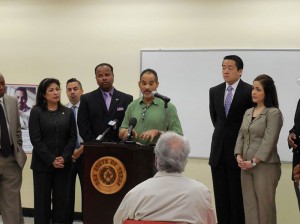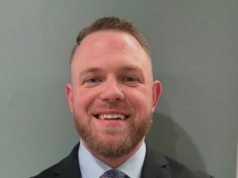Burnam learned firsthand just how vocal the anti-Obamacare crowd is during the 2013 legislative session. He attached an amendment to a budget bill that would have created a mechanism for implementing Medicaid expansion in a way particular to Texas — giving some legal wiggle room, in effect, in case the governor and the federal government figured out some compromise on Medicaid expansion.
“It passed with bipartisan support, but as soon as it did, the people who see Obamacare as a red flag began twittering and e-mailing and messaging their representatives,” the Fort Worth Democrat said. Within hours, the House voted to reconsider that approval. Seeing which way the wind was blowing, Burnam pulled down the amendment.
The ideological war with the president in general and the Affordable Care Act in particular is simply unbelievable, said Burnam. “In Kentucky they love the new Kynect Health Care but hate Obamacare, and they don’t realize that Kynect is Obamacare. That’s the kind of thing you’re up against here in Texas. It doesn’t matter that a million people would get health insurance. It doesn’t matter how many thousands of jobs would be created. The only thing that matters is that they hate Obamacare and won’t let their representatives forget it.”

Texas’ Republican members of Congress, especially Sen. Ted Cruz, have worked and spoken repeatedly against the ACA. Mel Moss, with the Arlington Tea Party, is similarly opposed to it.
“Obamacare will destroy the traditional system we have in Texas of employers covering healthcare,” and will generally increase healthcare costs, she said. “Just about every bad thing you have heard about it has come true.”
Coleman said he finds it “so hard to accept that people think that way. It’s hard because Texas has the highest rate and number of uninsured people in the country, and we’d benefit the most from the full implementation of the Affordable Care Act.”
Coleman acknowledged fears that states with full ACA implementation could see insurance rates climb next year. However, in the last week, officials in both Connecticut and Arkansas — among the first states to make projections about insurance costs — have said they anticipate modest decreases in healthcare premiums.
In other ways, by most accounts, the act, even without the Medicaid expansion, has had positive impacts.
Kids can now stay on their parents’ insurance policies until they are 26. Insurance companies have had to return billions of dollars to their customers because of a rule in the new law that requires insurance companies to spend 80 percent of their insurance premiums directly on actual healthcare, rather than on administrative costs. Hundreds of worthless insurance policies have been cancelled because they don’t meet the basic requirements of a policy under the ACA. Insurance companies can no longer charge a higher premium for women than men or turn people down for coverage because of a pre-existing condition. Nor can insurers any longer set annual or lifetime caps in coverage and then drop policyholders who have paid premiums for years.
Hector Carrillo, executive director of the Fort Worth chapter of LULAC, the oldest Hispanic organization in this country, sees some racism associated with the issue.
“A lot of people think that undocumented people will be getting free healthcare, but undocumented people don’t qualify for shit, of course,” he said. “Who is suffering because of this are all the people in that huge space between abject poverty and middle-class earners.”
An administrator at John Peter Smith hospital system, who asked that her name not be used, said their emergency room is as full as it was before the ACA was passed, because of the decision not to expand Medicaid.
“A lot of our people are poor, and the people who didn’t have Medicaid before don’t have it now,” she said. “So we do the best we can. The people … didn’t get anything that affects them from the new law. But that would change if Medicaid was expanded.”
Anne Dunkelberg, associate director of the Center for Public Policy Priorities, said that, without Medicaid expansion, “We have not done anything for the poorest people, which is why emergency rooms in Texas are still full.
“But we have seen reports from Arkansas where they accepted the expansion and have seen their emergency-room entries drop, as people now have an option of seeing a doctor in an office rather than going to the ER,” she said.
Coleman hasn’t given up. “My job and my colleagues’ job in the legislature is to work until we get something like the Medicaid expansion and get people good healthcare,” he said. “It’s hard to watch people like Gov. Perry put their foot on people’s necks for political reasons.”












So– all 23 states (out of 50) which have declined to expand Medicaid are “Republican run” as in: having Republican governors and legislatures? Nearly half of the states in the country have NOT expanded Medicaid– and this is Rick Perry’s “fault”? None of that is very logical.
P.S. Lon Burnam should be referred to as” recently defeated Texas Rep Lon Burnam (D) Fort Worth”
Governor Perry is only responsible for Texas having turned down the Medicaid expansion. The other governors are responsible for their own states.
OK–so you agree that 23 states (quite a few) also have declined to expand Medicaid. Some of these are probably not “Republican” states, and their elected officials have decided that Medicaid expansion is not desirable–just as Perry has. There was an article in the WSJ yesterday about declining Food Stamp use in states, like Texas, which are economically stable and which have enabled people to participate in the work force because of a good local economy, subsequently getting off of the welfare rolls. Most people want to be in an environment where they can be gainfully employed rather than in a declining welfare state. Being on Medicaid or other welfare is not ideal for the taxpayers or the welfare/Medicaid recipients. A good state economy is the most beneficial to all.
Yes, and Rick Perry has turned down 200,000 to 300,000 upper middle class jobs–enough to end unemployment in Texas, by refusing Medicaid expansion.
I am not even going to ask you to verify your numbers, I will ask you this, though, where is the money for those “jobs” coming from? Government jobs, paid with Government money, paid for by the people. Pretty soon everyone will be employed by the Government to enforce the Governments agenda, and those who actually contribute to the economy will be taxed to Death or Switzerland. New Utopia.
Perry has not “turned down” any viable jobs. Texas and other conservative well run states lead the nation in job creation.
Actually, the 20 states which have refused expanding Medicaid, and two of the three which are undecided, either have a Republican governor or Republican legislature. So yes, this is a partisan issue.
Aas for foodstamps: in 1971, a college kid could get $200 a month in about 20 minutes. Here in Texas in 2014, a family making something like $20 grand a year for four people–essentially homeless people–make too much to qualify. Texas has never welcomed poor people.
In 1971 college tuition was 1/10th of what it is today.Part of education”inflation” has more to do with govt. policies and tenure policies gone wrong then anything else combined with lax immigration policies. You need to have a basic history and economics tutorial,Mr. Gorman. Perhaps a basic math course also. For the record, in 1971 very few college students or grad students needed to be on food stamps, because life was more affordable–something which would be nice to see today or in the future when govt is reined in.
What exactly do you see in today’s world that gives you any hope that government will ever be “reigned in”?
Economically there is usually a “tipping point” where a turn around is possible because the status quo is intolerable.
First I must admit I have not finished the story because I got mad and had to put it down for a minute but I want to mention (in case this story does not) that the issue of affordable healthcare extends beyond the “poor” and unemployed/uninsured. I work and make a decent amount of money and I have a pretty good insurance policy. I pay a pretty hefty premium every month and with only a few minor health issues, I still can not afford to go to all the doctors I am supposed to see or pay for the diagnostic and preventative medical care I need. I have had to borrow money to cover my share. I know everything in this article about our governor is true and failure to expand Medicaid is a huge problem but the entire system is out of control. From where I am sitting it sure does fell like that as a country we simply do not care about providing quality healthcare to anyone but the wealthy. I recently paid twice as much for an MRI because I chose to run it through it through insurance so it could go against my deductible. What kind of scam is that and who is running this circus anyway?
To Stacy: The increases in insurance premiums and subsequent increase in deductibles has nothing to do with Gov. Perry or Medicaid expansion (which you probably would not qualify for -because you seem to be a hard worker- even if it was expanded–no offense). The insurance companies were 100% behind the PPACA legislation passed by the Obama administration and Democrat controlled Senate and Congress in 2010. To my knowledge no Republican voted for this cumbersome piece of legislation . Your premiums are high due to the mandates for coverage which are not applicable to much of the population. The fact is employers soon may not be able to subsidize your coverage–which will leave you further on your own. Meanwhile insurance companies are making more money than ever at your expense. As far as your MRI is concerned, most insurance companies have significantly reduced payment to outpatient facilities and non hospital physicians to a degree which makes it difficult for most physicians to stay in business. If you received an MRI in a hospital-the AHA has effective lobbyists, as do the health insurers- or in a hospital owned/affiliated outpatient or “mini ER” facility you will have to pay hospital prices which are 3-10X higher than ordinary unaffiliated outpatient facilities. The accreditation standards of cheaper outpatient facilities are equal to and frequently better than those at the hospital. Also many physicians direct patients to more expensive hospitals,surgery centers or imaging facilities where the primary care physician or surgeon has a part ownership. The referring doctor has an ethical obligation to disclose ownership or other financial ties to such facilities and this should be posted on the wall of the physician’s office. You should always ask, however. None of this,however has anything to do with Medicaid expansion in Texas or elsewhere.
I realize the two are not directly related and because of that, perhaps I should not have posted on this thread. I am just very frustrated. America claims to be the greatest nation in the world but we can not get this health care issue and many other equally
Important issues handled in a suitable manner. I would love to blame Perry and while he is definitely part of the problem, it goes much deeper. Frankly I am embarrassed to be part of a nation where profit seems the only motivation for anything.
There are many people in this country who have sacrificed so that their fellow citizens could have a better life. Profit is not the ONLY motivation for anyone I know.
When Baggers & Repugs are mentioned, Mother Therrisa immediately comes to mind. Good point skeptic. You’re a real piece of work skeptic…you know that? I’m praying for you.
Oh goody –the FWW TROLL has come back to life with its personal contributions to humanity which are less than ZERO. Pray for yourself– Benny.
Why don’t you get a decent job and amount to something reader? What do you eat? Pull yourself up by your bootstraps. Where is the Startle-Gram hang out now, the bus station?